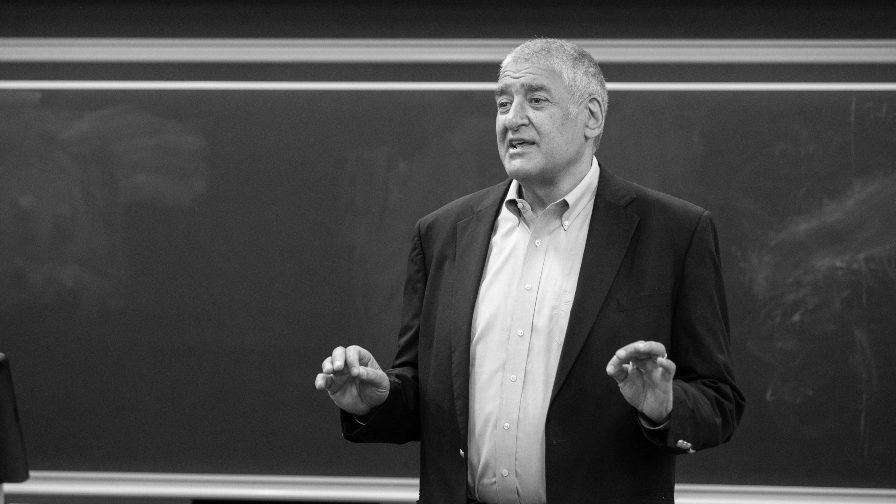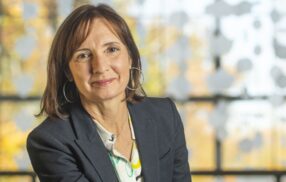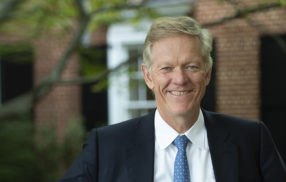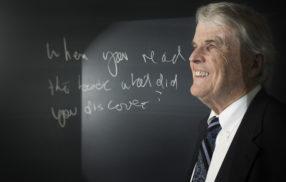
UVA Darden’s ‘Lean’ Master to Retire After More Than 30 Years of Cases and Conversations
By Dave Hendrick
Much of University of Virginia Darden School of Business Professor Elliott Weiss’s professional life has been devoted to process improvement — how to eliminate wasted effort and optimize processes. If one were to set up an interview to discuss his career at Darden, for instance, Weiss is apt to coax out the questions beforehand and send detailed answers, saving everyone a great deal of time.
Weiss lives and breathes Lean. In addition to scores of papers on the topic, he co-wrote The Lean Anthology: A Practical Primer in Continual Improvement, which offers lessons for optimizing all manner of everyday life. Now, after working with Darden students of all ages and stripes on Lean and related process improvement topics for more than three decades, Weiss retired from full-time teaching at the end of the academic year.
“I was a mathematical modeler and problem solver when I arrived at Darden,” said Weiss, who grew up in the Philadelphia area and taught at Cornell before coming to Darden. “I developed into someone much more interested in solving real problems and the issues related to implementing solutions.”
Coming to Darden in 1987, Weiss said the community made him feel “very welcomed, very quickly,” with colleagues like Professors Ed Davis, Bob Landel and Jim Freeland quickly integrating him into the area (and on to faculty sports teams).
Learning to ‘Teach People, Not Stuff’ at Darden
Although he thought himself a good teacher a Cornell, teaching the case method at Darden shifted how he viewed his role, realizing that he was “teaching people, not stuff.”
“The hardest part of the case method is figuring out the correct question to ask so that the students can develop the necessary skills for determining solutions and recommendations for themselves,” Weiss said. “The easiest and least effective questions are where I have an answer in mind and go around the room searching for the ‘right’ answer. That serves little purpose.”
Another shift at Darden: to actually slow down and listen to the student answers and reflect on a position he hadn’t previously considered. For an adherent of lifelong learning and continual improvement, the opportunity to “process alternative ways of approaching a problem” is one of the highlights of the Darden classroom.
Weiss credits Darden Professor Alec Horniman — who also recently retired from teaching full time — with influencing the transition to a people-centric teaching approach.
Co-teaching with Horniman in Darden Executive Education & Lifelong Learning programs in New Zealand, Weiss said he learned to focus on the people behind subjects like policy implementation and change management. Horniman helped him learn how to truly reach individuals and attempt to influence their direction, Weiss said — how to “invite them to the dance,” as Horniman would call it.
His people-centric approach went beyond the classroom, and Weiss said he’d like to be remembered as someone who cared about and tried to prioritize the students and staff at the Darden School, making sure the full impact on those critical constituencies were understood before actions were made.
Making Operations Relatable by Connecting it to Real Life
Operations management and inventory control can be nebulous concepts for MBA students without backgrounds in the space. Throughout his career, Weiss sought ways to drive home key operations strategies in relatable ways — the inventory of milk in a refrigerator or the optimal way to feed a baby at night, for instance.
When discussing the principles of the visual inventory management system Kanban, a mark on a hypothetical pitcher of beer helped instruct students as when to place the next round.
“Students don’t need another case on printed circuit boards,” Weiss said.
Indeed, Weiss’ voluminous case output spans fields and topics, with examples including tying a problem solving process to weight loss, using rabbits to teach service systems, Darden graduation as a means to teach calculating process operating parameters and the lessons a cult fast food chain could teach about lean transformation, among many, many others.
Weiss followed his interests in what he wrote about. Again making the optimal use of resources, he always tried to parlay effort into multiple outputs.
“Our most precious resource is time, so what I look for is projects where I can get what I call the triple crown of a research article, a case study and maybe make a difference for a company, as well,” said Weiss. “If I could work on a problem that appeals to multiple audiences at once — my academic colleagues, the students at Darden and real businesses, that was ideal.”
Weiss, whose CV literally lists “How to Spend Your Free Time” as a research interest, isn’t entirely sure what to do with more of it, although he says there will be more opportunities to volunteer, travel and to visit grandchildren.
And while Weiss will retire from full-time teaching, and will almost certainly wear less of his trademark bowtie in his day-to-day life, he isn’t leaving Darden’s orbit. He currently plans to teach global courses in Israel, Australia, China and Ghana next academic year.
The University of Virginia Darden School of Business prepares responsible global leaders through unparalleled transformational learning experiences. Darden’s graduate degree programs (MBA, MSBA and Ph.D.) and Executive Education & Lifelong Learning programs offered by the Darden School Foundation set the stage for a lifetime of career advancement and impact. Darden’s top-ranked faculty, renowned for teaching excellence, inspires and shapes modern business leadership worldwide through research, thought leadership and business publishing. Darden has Grounds in Charlottesville, Virginia, and the Washington, D.C., area and a global community that includes 18,000 alumni in 90 countries. Darden was established in 1955 at the University of Virginia, a top public university founded by Thomas Jefferson in 1819 in Charlottesville, Virginia.
Press Contact
Molly Mitchell
Associate Director of Content Marketing and Social Media
Darden School of Business
University of Virginia
MitchellM@darden.virginia.edu







